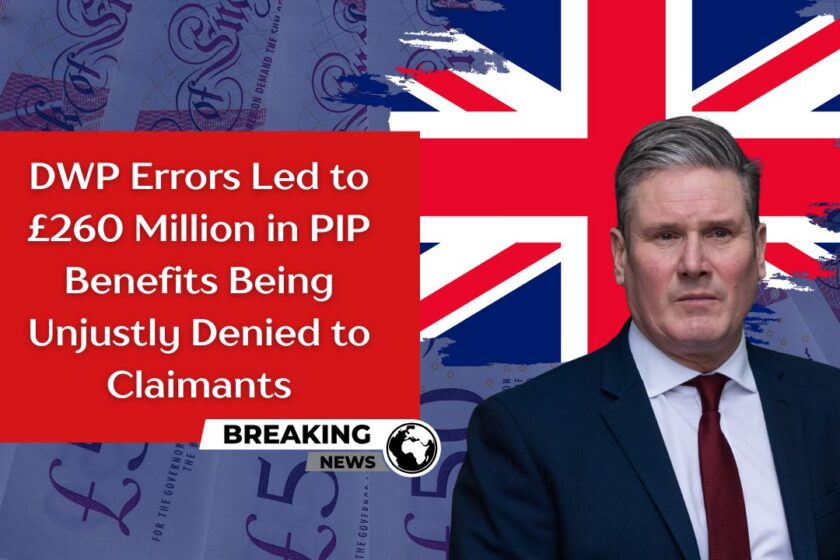More than £260 million has been disbursed to disabled individuals who were previously underpaid or wrongly denied their Personal Independence Payment (PIP) benefits. This revelation stems from the Department for Work and Pensions’ (DWP) latest annual report, which exposes systemic errors in benefit processing that may still affect thousands.
In addition to the money already paid out, the Government may face hundreds of millions more in compensation as additional errors come to light. Some disabled claimants could still be owed over £5,000 each, underscoring the gravity and scope of the oversight.
What Is PIP and Why It’s Controversial
PIP is a vital support payment designed to help disabled individuals manage daily living and mobility-related expenses. However, the benefit has been at the center of political tension, particularly under Keir Starmer’s Labour Government. While current PIP recipients are now shielded from future eligibility cuts—thanks to pressure from Labour backbench MPs—new applicants will encounter stricter qualifying conditions from November 2026, a move that has been widely criticized as potentially creating a “two-tier” system.
Three Main PIP Errors Identified
The DWP report highlights three significant types of PIP-related errors that led to thousands being underpaid or excluded:
- National Insurance Number Error
Claimants without a National Insurance (NI) number were wrongly excluded, even though it’s not a legal requirement for applying. To correct this, the DWP reviewed 455 cases and paid out £500,000 in backdated benefits. - Scottish Entitlement Loss During ADP Transition
Affected Scottish claimants lost PIP entitlement while transitioning to the Adult Disability Payment (ADP)—Scotland’s version of PIP launched in 2022. So far, £13 million has been reimbursed, with over 4,700 cases reviewed and 176 more under assessment. - Faulty Points System for Social Support
The most substantial error traces back to a 2016 tribunal ruling, which criticized the narrow criteria used by the DWP to assess “social support” needs during face-to-face interaction evaluations. The Supreme Court upheld the ruling in 2020, prompting a massive review.- To date, £250 million has been paid to over 308,000 affected individuals.
- However, an additional 325,000 cases still await review.
- In 2023, one in six reviews resulted in payments, with the average payout exceeding £5,200 per person.
The Fallout: Criticism and Advocacy
The slow pace of rectification has drawn widespread criticism from charities, policy experts, and former ministers:
- Ken Butler of Disability Rights UK urged the DWP to repay all owed money promptly.
- Ayla Ozmen of anti-poverty charity Z2K stressed that these errors can lead to “severe financial distress.”
- Sir Steve Webb, former Liberal Democrat DWP minister, noted the process should have moved much faster, though he acknowledged that the department is taking the right corrective measures.
In response, the DWP stated it is actively contacting claimants likely affected by the social support miscalculation, rather than requiring individuals to inquire themselves. The department is also undergoing a ministerial review of PIP, led by Labour’s disability minister Sir Stephen Timms, with a commitment to center disabled voices in the reform process.
Conclusion
The ongoing fallout from PIP underpayment errors exposes deep flaws in how disability benefits are managed in the UK. While £260 million has already been paid to right past wrongs, many affected individuals remain uncompensated, and the DWP’s credibility is under significant scrutiny. With reforms pending and another £250 million potentially on the line, the coming months will be critical for restoring trust and ensuring disabled people receive the support they are rightfully owed.
Frequently Asked Questions
1. How much money has been repaid to wrongly denied PIP claimants so far?
Over £260 million has already been returned to disabled individuals who were previously denied or underpaid PIP benefits due to administrative errors.
2. What are the three main types of errors identified in the DWP’s PIP process?
The errors include:
- Wrongly rejecting claims from those without National Insurance numbers,
- Loss of PIP during the Scottish ADP transition,
- Incorrect calculation of social support needs during assessments.
3. Could I still be owed money from a past PIP claim?
Yes. If you applied for PIP between 2016 and 2020 and were rejected or underpaid, you might be among the 325,000 cases still under review. The DWP will contact affected individuals.
4. What was the issue with the ‘social support’ criteria?
The DWP was found to have narrowly interpreted what qualifies as a need for social support, which caused many claimants to receive insufficient points and be denied PIP unfairly.
5. Will the PIP eligibility rules change in the future?
Yes. Starting November 2026, new applicants will face stricter eligibility criteria, though existing recipients are now protected following political pushback.

